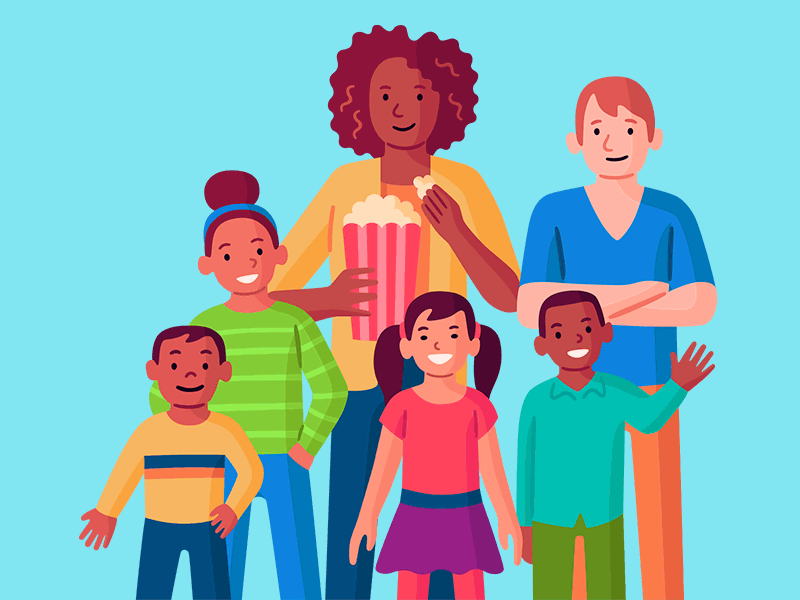➤ Family socialization is the first agent of socialization.
➤Commonly, there are three types of families, single parent, nuclear, and extended; each of the family may differently expose a child to the aspects of socialization. The main role of a family is to nurture, mold, and guide children in the society; therefore, a child who does not belong to any family may undergo a negative socialization process.
➤Mothers and fathers, siblings and grandparents, plus members of an extended family, all teach a child what he or she needs to know.
➤Family not only teach us how to care for ourselves, but also give us our first system of values, norms, and beliefs.
➤As infants, we are completely dependent on others to survive. Our parents, or those who play the parent role, are responsible for teaching us to function and care for ourselves. They, along with the rest of our family, also teach us about close relationships, group life, and how to share resources.
➤ All children are a product of their environment; thus, to impart positive social values in a child, parents should choose an environment free from any negative influence. Drug abuse, criminal activities, and immoral behaviors are some of the negative aspects an environment might impart in a growing child. Most children learn from their friends, peers, parents, neighbors, and schoolmates.
➤ Therefore, parents should familiarize with the friends of their children to ensure that the children do not deviate from the conventional social behaviors through external forces. In the light of this revelation, it suffices to conclude that, a family is a social institution that ensures that a child conforms to the acceptable standards of the society. The societal attributes that a family instills in a child include personality, skills/knowledge, social stability/order, cultural transmission, life aspirations, and social discipline among others.

How does the physical and material environment of the home influence the development of a child?
➤Although most families have similar ways of socialization, some aspects instilled in a child differ from one family to another. A child from a nuclear or single parent family may have limited interaction with other relatives or members of the society.
➤Each family ensures that its children learn and practice the prevalent culture; however, a child from a single parent family may only learn culture from one parent. Moreover, each parent/family has diverse ways of imparting social skills to children. While some parents are harsh and strict, others rely on dialogue to instill moral values in their children.
➸A child’s early home environment has a profound effect on his well-being. Beginning in infancy, a problematic home environment can disrupt the brain’s stress response system, reduce the quality of care giving a child receives, and interfere with healthy development
➸Family income and economic circumstances have a powerful effect on children’s development. Like other risk factors, low family income affects children mainly by affecting their home environments and the parenting they receive in ways that hinder optimal development.Income-related differences in parenting appear early. For instance, lower-income mothers are, on average, less affectionate, less responsive to their infants’ distress signals, and more likely to have harsh parenting styles. In poor and low-income families, the home environment is more likely to be chaotic, and parents are more likely to be stressed and unresponsive. They show less sensitivity and provide less cognitive stimulation.
➸ Like family income, parental education is a strong influence on children’s home environments. In some research on child outcomes, maternal education is a better predictor than family income. Among mothers of infants and toddlers, increases in education have been shown to promote improvements in young children’s home environments and language development. Parents’ education appears to be especially beneficial for children of poor, young, or single-mothers
➸Besides these, the environment within the family offers special learning conditions for the child and can thus positively improve the development. Especially for young children the home environment is very important and concrete activities, as, for example, reading aloud are very stimulating

➸A child’s early home environment has a profound effect on his well-being. Beginning in infancy, a problematic home environment can disrupt the brain’s stress response system, reduce the quality of care giving a child receives, and interfere with healthy development
➸Family income and economic circumstances have a powerful effect on children’s development. Like other risk factors, low family income affects children mainly by affecting their home environments and the parenting they receive in ways that hinder optimal development.Income-related differences in parenting appear early. For instance, lower-income mothers are, on average, less affectionate, less responsive to their infants’ distress signals, and more likely to have harsh parenting styles. In poor and low-income families, the home environment is more likely to be chaotic, and parents are more likely to be stressed and unresponsive. They show less sensitivity and provide less cognitive stimulation.
➸ Like family income, parental education is a strong influence on children’s home environments. In some research on child outcomes, maternal education is a better predictor than family income. Among mothers of infants and toddlers, increases in education have been shown to promote improvements in young children’s home environments and language development. Parents’ education appears to be especially beneficial for children of poor, young, or single-mothers
➸Besides these, the environment within the family offers special learning conditions for the child and can thus positively improve the development. Especially for young children the home environment is very important and concrete activities, as, for example, reading aloud are very stimulating

NEED MORE INFORMATION ?
look up these..

Comments
Post a Comment